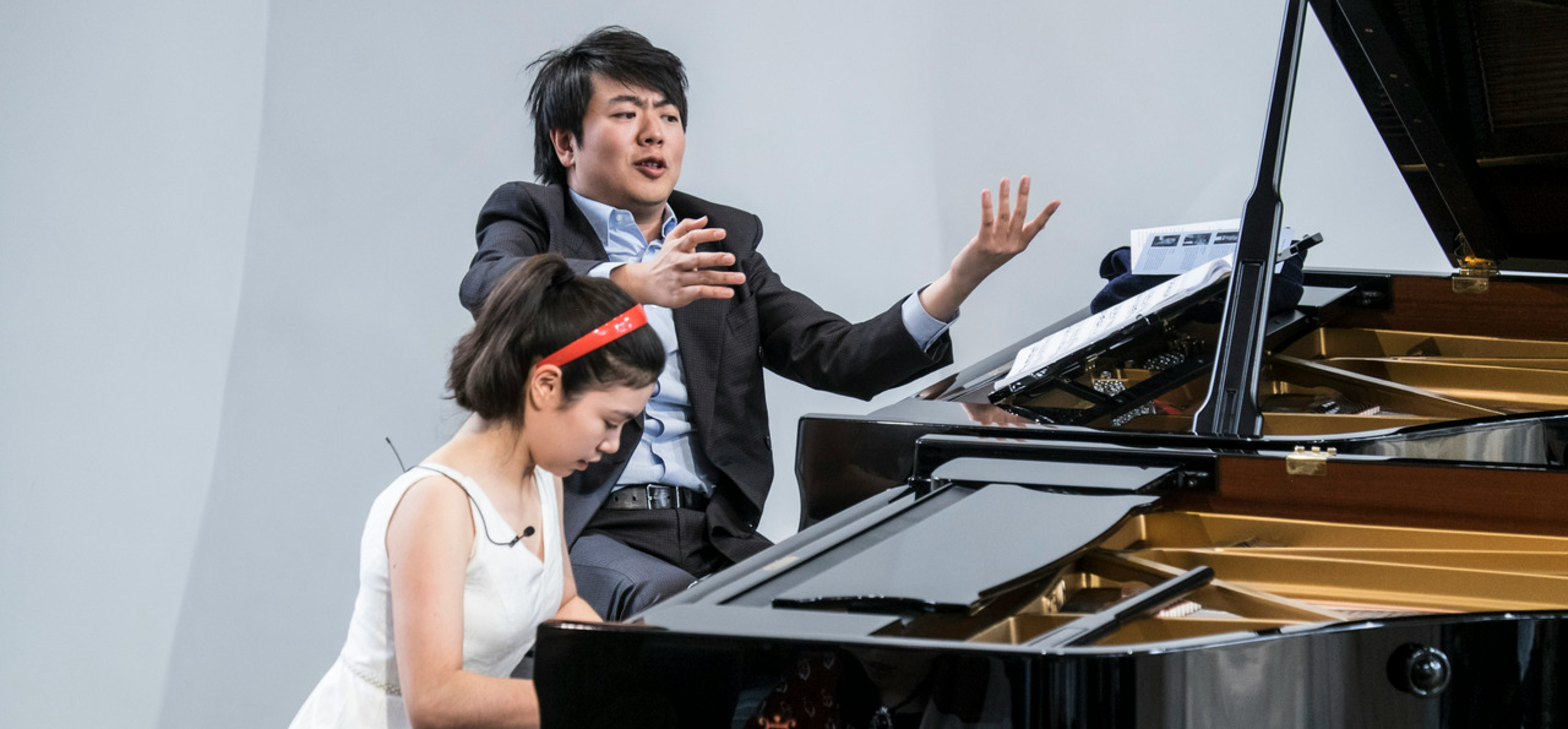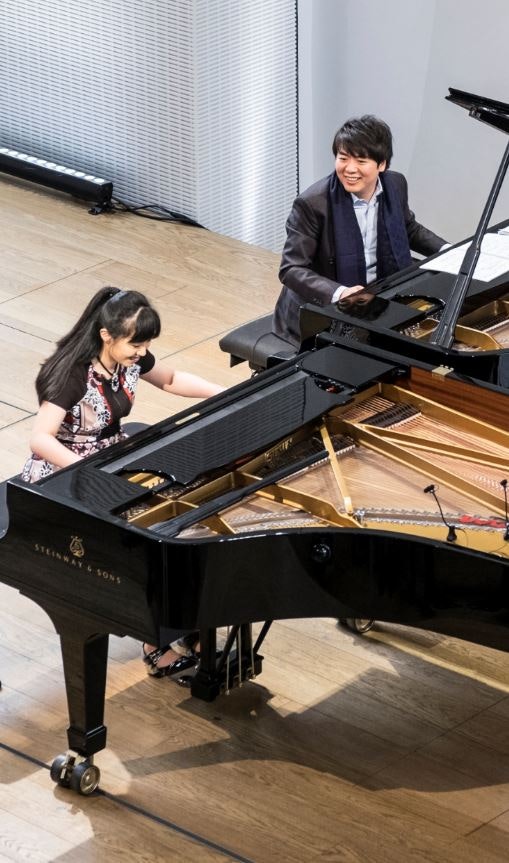Lang Lang International Music Foundation Masterclasses and concerts

- Date
- From 20.02.2016 to 21.02.2016
- Place
- Auditorium
Seven young pianists aged from 12 to 17 years old.
Two teachers: Lang Lang and Gary Graffman.
Young musical prodigies from the Lang Lang Music Foundation will hone their talents over a special weekend-long residency of masterclasses in the Auditorium of the Fondation Louis Vuitton. Internationally renowned pianist Lang Lang created the Lang Lang Music Foundation to train, inspire and nurture a new generation of musicians and classical music lovers.
Seven pianists aged 12 to 17, specially selected for the residency at Fondation Louis Vuitton, will attend masterclasses taught by Lang Lang and his former teacher Gary Graffman as an audience looks on.
The masterclasses will culminate in two concerts showcasing the students’ hard work and progress thanks to the residency.
Lang Lang International Music Foundation
Lang Lang International Music Foundation
The mission of the Lang Lang International Music Foundation™ is to educate, inspire and motivate the next generation of music lovers and performers. We encourage music performance at all levels as a means of social development for youth, building self-confidence and a drive for excellence. With unique programs that are sustainable and meaningful, we create a spirit of collaboration in which participants contribute to a cultural conversation that will, over time, translate into a greater awareness of humanity.
For over 15, years, Lang Lang has dedicated his time to furthering music education. Since the founding of the Lang Lang International Music Foundation™ in 2008, he has taken his commitment to music education to the next level by developing sustainable, impactful and unique charitable activities, as well as establishing partnerships with dedicated organizations. We strive to ignite a passion for music in youth so that they can be leaders in bridging cultural gaps, helping to unite local and global communities. We believe that by encouraging music study and expression, we are laying the groundwork for a brighter tomorrow.

the artists
Lang Lang
“I have taken on a second career!” said Lang Lang at the Fondation launch event.
If one word applies to Lang Lang, to the musician, to the man, to his worldview, to those who come into contact with him, it is “inspiration”. It resounds like a musical motif through his life and career.
He inspires millions with his open-hearted, emotive playing, whether it be in intimate recitals or on the grandest of stages – such as the 2014 World Cup concert in Rio, with Placido Domingo, to celebrate the final game; the 56th GRAMMY awards, where he performed with Metallica; the Opening Ceremony of the 2008 Beijing Olympics, where more than four billion people around the world viewed his performance; the Last Night of the Proms at London’s Royal Albert Hall, or the Liszt 200th birthday concert with the Philadelphia Orchestra and Charles Dutoit which was broadcast live in more than 300 movie theaters around the United States and 200 cinemas across Europe (the first classical music cinemacast to be headlined by a solo artist). He forms enduring musical partnerships with the world’s greatest artists, from conductors such as Daniel Barenboim, Gustavo Dudamel and Sir Simon Rattle, to artists from outside of classical music – among them dubstep dancer Marquese “nonstop” Scott, king of the crooners Julio Inglesias and jazz titan Herbie Hancock. He even builds relationships with corporations who will help him get classical music to ever-more people – thanks to his Sony ambassadorship, for instance, he brought Prokofiev’s 7th Piano Sonata to the soundtrack of the multi-million-selling computer game Gran Turismo 5and 6! And he builds cultural bridges between East and West, frequently introducing Chinese music to Western audiences, and vice versa.
Yet he never forgets what first inspired, and continues to inspire him. Great artists, above all the great composers – Liszt, Chopin and the others – whose music he now delights in bringing to others. Even that famous old Tom and Jerry cartoon “The Cat Concerto” which introduced him, as a delighted child, to the music of Liszt – and that childlike excitement at the discovery of music now surely stays with him and propels him to what he calls “his second career”, bringing music into the lives of children around the world, both through his work for the United Nations and through his own Lang Lang International Music Foundation. As he inspires, he is inspired. As he is inspired, he inspires others. It is this quality, perhaps, that led the New Yorker to call him “the world’s ambassador of the keyboard”.
It takes a special kind of dedication to come from a small Chinese town, Shenyang, to travel to the big city as a small child and to win the attention of the country’s finest music professors. And then to leave behind your home country altogether to join the world-famous Curtis Institute of Music in Philadelphia, USA. Lang Lang achieved all of these early on – he started playing piano at age three, won the Shenyang Competition and gave his first public recital by the time he was five, entered Beijing’s Central Music Conservatory aged nine, won first prize at the Tchaikovsky International Young Musicians’ Competition and was playing the complete Chopin Etudes at the Beijing Concert Hall at 13. He left for America, Curtis and the great piano teacher Gary Graffman and when his moment came, he was ready. That moment happened when, aged 17, he was called upon to make a dramatic last-minute substitution for the famous Andre Watts to perform in the “Gala Of The Century”, playing a Tchaikovsky concerto with the Chicago Symphony Orchestra. It made him what journalists like to call an “overnight star” and the world’s finest concert halls quickly beckoned.

Gary Graffman
The celebrated pianist Gary Graffman has been a major figure in the music world since winning the prestigious Leventritt Award in 1949. For the next three decades he toured almost continuously, playing the most demanding works in piano literature both in recital and with the world’s great orchestras. He also made a series of highly acclaimed recordings for Columbia (CBS) and RCA, including concertos by Tchaikovsky, Rachmaninoff, Prokofiev, Brahms, Chopin and Beethoven with the orchestras of New York, Philadelphia, Cleveland, Chicago and Boston, and with such conductors as Leonard Bernstein, Zubin Mehta, Eugene Ormandy and George Szell.
In 1979, however, Mr. Graffman’s performing career was curtailed by an injury to his right hand. His performances are now limited to the small but brilliant repertoire of concertos written for the left hand alone, most of them commissioned early in the century by Paul Wittgenstein, who lost his right arm in World War I. In addition to the famous Ravel Concerto, these include major works by Prokofiev, Britten, Richard Strauss, Franz Schmidt and Erich Wolfgang Korngold. Mr. Graffman played the North American premiere of the latter concerto, written in 1924, with Zubin Mehta and the New York Philharmonic in 1985 and has recorded the Strauss “Parergon” for Deutsche Grammophon with the Vienna Philharmonic led by André Previn.
The reduction in Mr. Graffman’s concert activity has provided him with a remarkable opportunity to expand his horizons beyond the stage. Most notable has been his leadership of the renowned Curtis Institute of Music in Philadelphia. He first joined its piano faculty in 1980 and became Director of the all-scholarship conservatory in 1986, following such illustrious predecessors as Josef Hofmann, Efrem Zimbalist and Rudolf Serkin. He was appointed President of The Curtis Institute in 1995, a position he served until May 2006.
Gary Graffman’s performing career was auspiciously linked to his academic life in 1993, when he joined conductor André Previn and the Symphony Orchestra of the Curtis Institute of Music for the world-premiere performances of Ned Rorem’s Piano Concerto No. 4 (for the Left Hand). Dedicated to Mr. Graffman by the Pulitzer Prize-winning composer — who is also a Curtis alumnus and faculty member — the concerto was performed at Philadelphia’s Academy of Music and, a day later, at Carnegie Hall. A compact disc recording of the premiere is available on New World Records. He went on to perform this work with the San Francisco Symphony and Zurich’s Tonhalle Orchestra.
In April 1996 Mr. Graffman performed the world premiere of William Bolcom’s “Gaea” Concerto for Piano and Two Left Hands with his friend and colleague Leon Fleisher. The work, commissioned jointly by the Baltimore, St. Louis and Pacific symphonies, was given its premiere by the two soloists and David Zinman and the Baltimore Symphony, first in Baltimore and then at Carnegie Hall. It was subsequently heard with the Saint Louis and Pacific symphonies and, in November 1998, with the Philadelphia Orchestra, again with David Zinman conducting.
In continuing his championing of new works for piano left hand and orchestra, in 2001-02 Mr. Graffman gave world premiere performances of three concertos, all of which were written for him: Daron Hagen’s “Seven Last Words” with the New Mexico Symphony and Buffalo Philharmonic; Richard Danielpour’s “Zodiac” Variations with the National Symphony in Washington, D.C.; and Luis Prado’s Concerto for Left Hand with the Chamber Orchestra of Philadelphia. In March 2003 he premiered another concerto written for him, this one by Stanislaw Skrowaczewski, with the Minnesota Orchestra. This work was recorded by Reference Recordings.
In the summer of 2005, Gary Graffman received an invitation to head the piano department at the new Canton International Summer Music Academy in Guangdong, China, giving him an opportunity to explore his love of education, chamber music, and Chinese culture. He has also participated in the Santa Fe Chamber Music Festival, Chamber Music Northwest and the 10th Anniversary of Morningside Music Bridge held in Shanghai.
Gary Graffman is the author of the highly praised memoir, “I Really Should Be Practicing,” published by Doubleday in 1981 and issued in paperback by Avon the following year. In 2011, a Chinese translation was released in Taiwan. He has also written popular articles on non-musical subjects and found time to pursue a scholarly interest in Asian Art (which he collects) and photography. He has received honorary doctorates from the University of Pennsylvania and The Juilliard School, among others. He has received honours from the City of New York with its Handel Medallion, the City of Philadelphia on its Walk of Fame, and the Commonwealth of Pennsylvania as recipient of the Governor’s Arts Award, recognizing him for his varied accomplishments, including his “leadership of Curtis.”
Gary Graffman, whose parents are Russian, was born in New York and began to play the piano at age three. His father, a violinist, gave him a small fiddle, but when the instrument proved too cumbersome, he began piano lessons, though a return to the violin was planned. The young Graffman’s affinity for the piano soon became evident, however, and at seven the Curtis Institute accepted him to study with the renowned Isabelle Vengerova — exactly 50 years before he would become the school’s director, a position he held through May 2006. After graduation from Curtis, he worked intensively for several years with Vladimir Horowitz and, during the summers, at the Marlboro Music Festival with Rudolf Serkin.

Lang Lang International Foundation - Promotion 2016
Avery Lin Gagliano, 14 years old, American
Clayton Stephenson, 16 years old, American
Janice Carissa, 17 years old, Indonesian
Elliot Wuu, 16 years old, American
Matthew Chan, 14 years old, Chinese
Maxim Lando, 13 years old, American
Sherri Lun, 12 years old, Chinese
The programme
-
Saturday 20 February 2016
-
11:30 a.m. to 1:30 p.m.
Public Masterclass with Lang Lang
-
5 p.m. - 6 p.m.
Students' concert
-
-
Sunday 21 February 2016
-
11:30 a.m. to 1:30 p.m.
Public Masterclass with Gary Graffman
-
5 p.m. - 6 p.m.
Students' concert
-

